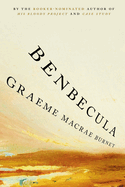
Graeme Macrae Burnet's sixth novel, the intriguing, darkly comical Benbecula, recounts a real-life mid-19th-century murder spree on a tiny Scottish island. It is at once a pitch-perfect historical reconstruction and a frank depiction of hereditary mental illness.
The aging MacPhees and their four adult children scrape together a living on an Outer Hebridean croft by growing potatoes and gathering kelp. On July 9, 1857, 26-year-old Angus kills his parents and aunt and flees to a smaller island. When apprehended, he initially lies that he saw a tinker enter the house but soon matter-of-factly confesses. His excuse--absurd to readers but perfectly logical to him--involves a bowl of porridge.
Burnet (Case Study; A Case of Matricide) depicts the troubled MacPhee family through the memories of Angus's irascible older brother, Malcolm. Angus's behaviors would today be associated with neurodivergence and mental illness but then signaled depravity: disruptiveness at school, flapping and moaning, public masturbation, and aggression that could only be controlled by tying him up. According to a neighbor, "some members of the family had occasionally fits of insanity." And indeed, Malcolm--alone, visited weekly by a caretaker, and haunted by visions of his departed family--seems just as troubled as his brother.
An afterword reveals the novel's source documents and casts a compassionate eye on Angus who, no matter his misdeeds, suffered abominably during 42 years of incarceration. As in his novel His Bloody Project, a finalist for the Booker Prize, Burnet proves himself a master of the faux historical testimony--and the unreliable narrator. --Rebecca Foster, freelance reviewer, proofreader, and blogger at Bookish Beck

